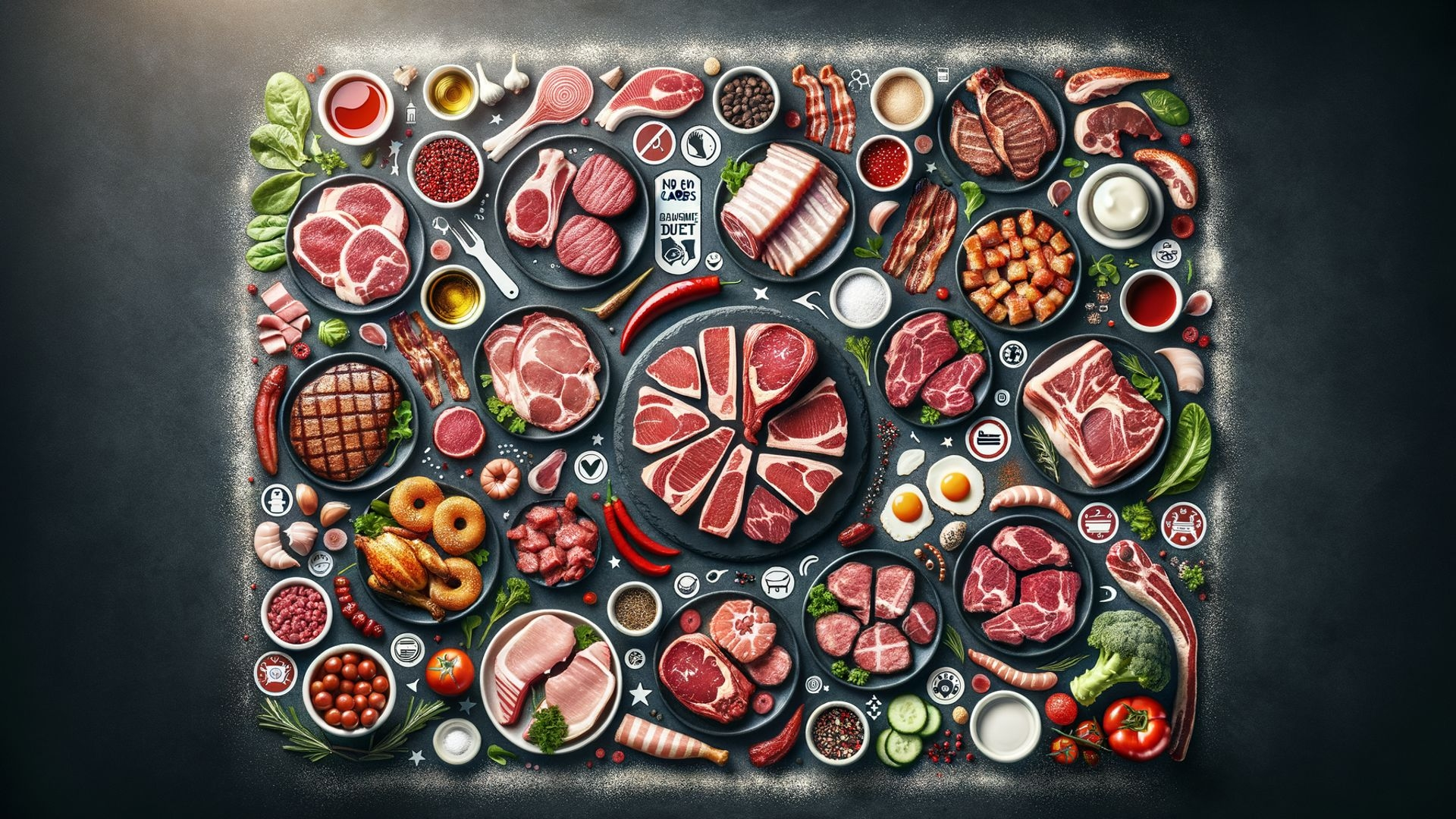Unlocking the Potential of Meat Consumption for Weight Loss and Health
Meat, a vital component of many diets, has been the subject of various discussions, especially when it comes to weight loss. In this comprehensive guide, we delve into the world of meat consumption, particularly focusing on the carnivore diet and the best types of meat that can help you achieve your weight loss goals while promoting optimal health. The carnivore diet is a type of diet that consists primarily of eating animal products, with little to no plant-based foods. Advocates of this diet believe that eliminating carbohydrates and focusing on nutrient-dense foods like meat can lead to weight loss, improved metabolic function, and overall better health.
When it comes to choosing the best types of meat for weight loss on a carnivore diet, it’s important to consider the quality of the meat you are consuming. Opt for pasture-raised, grass-fed, organic, or wild-caught options whenever possible. These types of meats are often higher in important nutrients like omega-3 fatty acids, vitamins, and minerals, and are free from added hormones and antibiotics.
What Is the Carnivore Diet and How Can It Help with Weight Loss?
Understanding the Basics of the Carnivore Diet
The carnivore diet is a dietary approach that emphasizes the consumption of meat while excluding most other food groups. Advocates of this diet claim numerous health benefits, including weight loss, improved energy levels, and better mental clarity. While the carnivore diet may lead to weight loss initially, it is important to note that it is a very restrictive diet that lacks key nutrients such as fiber, vitamins, and minerals found in plant-based foods. This can lead to deficiencies over time and potentially harm your health.
Additionally, consuming high amounts of red and processed meats has been linked to an increased risk of various health conditions, including heart disease, cancer, and diabetes. It is recommended to consume a balanced diet that includes a variety of food groups to ensure you are getting all the nutrients your body needs. If you are considering trying the carnivore diet, it is important to speak with a healthcare provider or a registered dietitian to ensure you are meeting your nutritional needs and not putting your health at risk.
How Does the Carnivore Diet Aid in Weight Loss?
One of the key reasons the carnivore diet is believed to aid in weight loss is its low-carb nature. By eliminating carbohydrates and focusing on consuming protein and fats found in meat, the body is encouraged to burn fat for energy, leading to weight loss.
Furthermore, the high protein content of the carnivore diet can also help to increase metabolism and promote muscle growth, which can aid in burning calories and losing weight. Protein also helps to keep you feeling full and satisfied, reducing cravings and helping to prevent overeating.
Additionally, many people who follow the carnivore diet report feeling more energized and experiencing improved mental clarity, which can lead to increased physical activity and a more active lifestyle, further supporting weight loss efforts.
Potential Downsides to Consider When Following the Carnivore Diet
While the carnivore diet may offer benefits for weight loss, it is essential to be aware of potential drawbacks, such as nutritional deficiencies due to the exclusion of certain food groups like fruits, vegetables, and grains.
Some potential risks of following a strict carnivore diet include:
1. Lack of essential nutrients: Fruits, vegetables, and grains provide essential vitamins, minerals, fiber, and antioxidants that are necessary for overall health. By eliminating these food groups, you may be at risk for nutrient deficiencies, such as vitamin C, vitamin A, potassium, and fiber.
2. Digestive issues: Some individuals may experience digestive discomfort, such as constipation, due to the lack of fiber in a carnivore diet. Fiber is essential for gut health and regular bowel movements.
3. Impact on gut microbiome: A diverse diet that includes a variety of plant-based foods is essential for maintaining a healthy gut microbiome. Excluding these foods can disrupt the balance of good bacteria in the gut and may lead to digestive issues and inflammation.
4. Sustainability and ethical concerns: The production of animal products can have a significant environmental impact, including greenhouse gas emissions, deforestation, and water pollution. Additionally, there are ethical concerns surrounding the treatment of animals in industrial farming practices.
It is important to consult with a healthcare provider or registered dietitian before starting any new diet, including the carnivore diet, to ensure that you are meeting your nutritional needs and to discuss potential risks and benefits. It may be possible to incorporate some aspects of the carnivore diet while still including a variety of plant-based foods to ensure a balanced and sustainable approach to eating.
Best Meats to Include in Your Diet for Optimal Weight Loss
Benefits of Choosing Lean Meats
When it comes to weight loss, selecting lean cuts of meat is advantageous. Lean meat is rich in protein, which can help you feel full longer, aiding in weight management. Furthermore, lean cuts of meat are lower in unhealthy saturated fats, making them a healthier option for those looking to lose weight. Incorporating lean meats such as chicken, turkey, and fish into your diet can help you meet your weight loss goals while still enjoying delicious and satisfying meals.
Additionally, lean cuts of meat are packed with essential nutrients such as iron, zinc, and B vitamins, which are important for overall health and wellbeing. In addition to choosing lean cuts of meat, it is important to pay attention to portion sizes and cooking methods. Opt for grilling, baking, or broiling meats instead of frying them to avoid adding extra calories from oils and fats.
Pair lean meats with plenty of vegetables and whole grains to create balanced and nutritious meals that will support your weight loss journey. By making smart choices and prioritizing lean meats in your diet, you can achieve your weight loss goals while still enjoying tasty and satisfying meals.
Exploring the Impact of Different Types of Meat on Weight Loss
Different types of meat can have varying effects on weight loss. Opting for meats with lower fat content and higher protein content can be beneficial for those looking to shed excess pounds. Lean meats such as chicken, turkey, and fish are good options for weight loss as they are lower in fat and calories compared to fattier cuts of meat like beef and pork. Protein is known to be more filling and satisfying than carbohydrates or fats, which can help control hunger and reduce overall calorie intake.

Why Grass-Fed Beef and Skinless Chicken Breast Are Ideal Choices
Grass-fed beef and skinless chicken breast are often recommended for weight loss due to their lean protein content and lower saturated fat levels compared to fattier cuts of meat. In addition to being lower in unhealthy fats, grass-fed beef and skinless chicken breast are also rich sources of protein, which can help with satiety and promote muscle growth and repair.
Protein takes longer to digest than carbohydrates, helping you feel full for longer periods of time and potentially reducing overall calorie intake.
Furthermore, lean protein sources like grass-fed beef and skinless chicken breast are also packed with essential nutrients such as iron, zinc, B vitamins, and magnesium, which are important for overall health and energy metabolism.
Choosing the Right Meats for Your Weight Loss Goals
How Salmon Contributes to Weight Loss and Heart Health
Salmon, a fatty fish, is an excellent source of protein and healthy fats like omega-3 fatty acids. These nutrients not only support weight loss but also promote heart health. Salmon is also rich in vitamins and minerals such as vitamin D, selenium, and B vitamins, which all contribute to overall health and well-being.
These nutrients help to reduce inflammation in the body, improve brain function, and support a healthy immune system. Incorporating salmon into your diet can help boost metabolism, increase feelings of fullness, and keep you satisfied for longer periods of time.
This can be especially beneficial for weight loss or maintenance, as it can help to prevent overeating and snacking on unhealthy foods. If you’re looking to improve your heart health and overall well-being, consider adding salmon to your weekly meal plan. Whether baked, grilled, or pan-seared, salmon is a versatile and delicious protein option that can benefit your health in a number of ways.
Understanding the Role of Processed Meats in Weight Loss
Processed meats, while convenient, may have negative effects on weight loss due to their high sodium and preservative content. It’s important to consume them in moderation and opt for healthier alternatives whenever possible.
Additionally, processed meats, such as hot dogs, sausages, and deli meats, are often high in saturated fats, which can contribute to weight gain and increase the risk of heart disease. These fats can also contribute to inflammation in the body, which can hinder weight loss efforts.
When trying to lose weight, it’s important to focus on consuming whole, unprocessed foods such as lean proteins, fruits, vegetables, whole grains, and healthy fats. These foods provide essential nutrients and are lower in sodium and preservatives compared to processed meats. You can also opt for lean cuts of fresh meat, poultry, and seafood to meet your protein needs while avoiding the harmful effects of processed meats.

Red Meat: Friend or Foe in Your Weight Loss Journey?
The debate surrounding the consumption of red meat continues, with some studies suggesting a link between red meat intake and increased risks of certain health conditions. Moderation and choosing lean cuts are advised for those on a weight loss journey.
Furthermore, red meat is often high in saturated fats and cholesterol, which can contribute to heart disease and other health issues. Therefore, it is important to be mindful of portion sizes and to balance red meat consumption with other sources of protein, such as fish, poultry, beans, and lentils. On the other hand, red meat is a rich source of essential nutrients such as iron, zinc, and vitamin B12, which are important for overall health and well-being.
For those who choose to include red meat in their diet, it is recommended to opt for lean cuts, trim any visible fat, and limit intake to a few times per week. Ultimately, the key is moderation and balance when it comes to red meat consumption.
Important Considerations When Incorporating Meat in a Weight Loss Diet
Impact of Saturated Fat and Cholesterol on Weight Loss
High intake of saturated fat and cholesterol from meat may impact weight loss efforts and overall health. It’s crucial to balance your meat consumption with other nutrient-dense foods to maintain a healthy diet.
Foods high in saturated fat and cholesterol, such as red meat and processed meats, can contribute to weight gain and increase the risk of diseases like heart disease and diabetes. Research has shown that replacing these meats with lean protein sources like poultry, fish, and plant-based proteins can help improve weight loss and overall health. In addition to watching your meat intake, it’s important to focus on consuming a variety of nutrient-dense foods like fruits, vegetables, whole grains, and healthy fats.
These foods can provide essential vitamins, minerals, and fiber to support overall health and help with weight management. If you’re looking to improve your weight loss efforts, consider incorporating more plant-based meals into your diet and reducing your intake of red and processed meats. Experimenting with different protein sources like tofu, lentils, and beans can help add variety to your meals and support your health goals.
Managing Sodium Intake While Consuming Meat for Weight Loss
Sodium, often present in processed and cured meats, can contribute to water retention and bloating, affecting your weight loss progress. Keeping an eye on your sodium intake is essential for successful weight management.
Additionally, protein found in meat can also help boost metabolism by requiring more energy to digest compared to carbohydrates and fats. This thermic effect of food can increase calorie burning and aid in fat loss.
Furthermore, meat is rich in essential nutrients like iron, zinc, and B vitamins, which are important for maintaining a healthy metabolism and energy levels. These nutrients play a key role in converting food into energy and promoting overall metabolic health.

Meat Consumption and its Effects on Conditions like Type 2 Diabetes
Research suggests that certain types of meat consumption may influence the risk of developing conditions like type 2 diabetes. By choosing leaner cuts and balancing your diet, you can help mitigate such risks. One study published in the American Journal of Clinical Nutrition found that consumption of processed meats, such as bacon and hot dogs, was associated with a higher risk of developing type 2 diabetes. This is likely due to the high levels of saturated fats and preservatives found in processed meats.
On the other hand, choosing leaner cuts of meat, such as poultry and fish, can help lower your risk of developing type 2 diabetes. These types of meats are lower in saturated fats and higher in healthier fats like omega-3 fatty acids, which have been shown to have beneficial effects on insulin sensitivity.
Balancing your diet with a variety of protein sources, including plant-based sources like beans and nuts, can also help reduce your risk of developing type 2 diabetes. Studies have shown that replacing some animal protein with plant-based protein can improve insulin sensitivity and lower the risk of developing diabetes.
Overall, making healthier choices when it comes to meat consumption can help reduce your risk of developing type 2 diabetes and other chronic conditions. By balancing your diet and choosing leaner cuts of meat, you can support better overall health and well-being.
Maximizing the Benefits of a Carnivore Diet for Efficient Weight Loss
How Eating Meat Helps Burn Fat and Consuming Fewer Calories
The consumption of meat can aid in burning fat by promoting satiety and helping you consume fewer calories overall. This, combined with an active lifestyle, can lead to efficient weight loss. Meat is a good source of protein, which is known to be more filling and satisfying than carbohydrates or fats.
In addition, protein requires more energy to digest, which can help boost your metabolism and aid in fat burning. Several studies have shown that high-protein diets can lead to greater weight loss and fat loss compared to lower protein diets. This is because protein can help preserve muscle mass while promoting the use of fat for energy. It’s important to choose lean cuts of meat, such as chicken, turkey, and lean beef, to avoid consuming excess saturated fats.
Including a variety of meats in your diet, along with plenty of fruits, vegetables, and whole grains, can help you achieve a balanced and nutritious diet that supports weight loss. Remember that moderation is key, and it’s important to monitor portion sizes and total calorie intake to achieve your weight loss goals.
Consulting with a healthcare provider or registered dietitian can help you create a personalized plan that includes meat as part of a healthy and sustainable weight loss strategy.
Ensuring Heart Health While on a Carnivore Diet
While a carnivore diet is high in meat consumption, choosing lean and healthy options like fish and poultry can support heart health by providing essential nutrients without excess saturated fats. In addition, incorporating a variety of fruits and vegetables into your diet can supply essential vitamins and minerals that are important for overall health. These foods are also high in antioxidants, which can help reduce inflammation and protect against chronic diseases. It’s also important to pay attention to the quality of the meat you consume. Opting for grass-fed and organic meats can provide more nutrient-dense options compared to conventionally raised meats. Avoiding processed meats and limiting red meat intake can also help lower the risk of heart disease.
The Role of Meat in a Comprehensive Weight Loss Strategy
Meat, when included as part of a balanced diet, can be a valuable source of protein, vitamins, and minerals necessary for maintaining a healthy weight. Understanding the nutritional value of different meats is key to optimizing your weight loss journey.
Different types of meat have varying levels of fat, protein, and vitamins, so it’s important to choose lean cuts of meat and incorporate a variety of meats into your diet. Chicken and turkey are lean meats that are low in saturated fats and high in protein, making them great choices for weight loss. Fish, such as salmon and tuna, are also good options as they are high in Omega-3 fatty acids, which have numerous health benefits.
Red meats like beef and pork can also be part of a healthy diet, but it’s important to choose lean cuts and limit portion sizes to avoid consuming too much-saturated fat. Additionally, processed meats like bacon, sausage, and deli meats should be consumed in moderation due to their high sodium and preservative content.
Best Meat Diet To Lose Weight Frequently Asked Question
What are some meats to avoid when trying to unlock the potential of meat consumption for weight loss and health?
Meats to avoid include processed meats like sausages, bacon, and deli meats that are high in sodium and unhealthy fats. Also, fatty cuts of red meat like ribeye steak and pork belly should be limited.
Can eating meat help you lose weight?
Including lean sources of meat in your diet can help you lose weight, as it is a high-protein food that can keep you feeling full and satisfied, reducing overall calorie intake.
Is a meat-heavy diet the best diet for weight loss and overall health?
While meat can be a part of a healthy diet, it should not be the sole focus. A balanced diet that includes a variety of foods such as fruits, vegetables, whole grains, and lean proteins is considered the best for weight loss and overall health.
What are the downsides to the carnivore diet, which mainly focuses on meat consumption?
The carnivore diet, which excludes most plant-based foods, may lack essential nutrients like fiber, vitamins, and minerals. It can also increase the risk of heart disease due to the high intake of saturated fats from certain meats.
How does meat consumption fit into a healthy eating plan?
Meat can be a part of a healthy diet when consumed in moderation and paired with a variety of other nutritious foods. Opting for lean cuts of meat and incorporating different types of protein sources can contribute to a balanced eating plan.
Can following a meat-only diet provide all necessary nutrients for healthy body function?
A meat-only diet may lack certain nutrients such as fiber, vitamin C, and some phytonutrients found in plant-based foods. Supplementation or careful planning may be required to avoid deficiencies over time.
Is the carnivore diet considered a fad diet, and why might it not be sustainable for everyone?
The carnivore diet is often considered a fad diet because it promotes extreme dietary restrictions and elimination of entire food groups. It may not be sustainable due to potential nutrient deficiencies, social constraints of avoiding plant foods entirely, and individual health conditions that could make such a restrictive approach unsuitable.
How should someone interested in trying a meat-focused diet for weight loss approach nutrition to ensure they are still getting a balanced intake?
Someone interested in trying a meat-focused diet should consult with a healthcare provider or registered dietician prior to starting. They should focus on including various types of meats (including organ meats) for nutrient diversity while considering supplementation for nutrients typically obtained from plants. Additionally, they should monitor their overall health markers regularly.
Are there any scientific studies supporting the efficacy of the carnivore diet for long-term weight loss?
Scientific research on the long-term effects of the carnivore diet specifically for weight loss is limited. While short-term benefits have been reported anecdotally and some preliminary studies suggest potential short-term weight loss benefits from low-carb diets, more research is needed to understand its long-term health implications.






